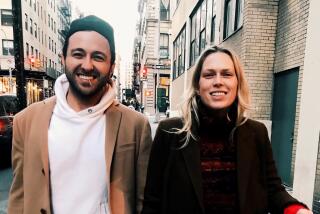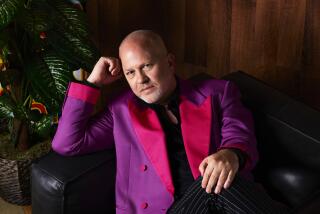He can relate
- Share via
Chris Colfer, a teenage community theater actor from Clovis, Calif., was auditioning before the TV writer he most admired -- Ryan Murphy, the creator of “Nip/Tuck.” Standing in Murphy’s office, surrounded by props and photographs from the FX series, all the recent high school graduate with big blue eyes and pale skin really wanted to do was ask for next season’s spoilers. And then he dropped his script pages.
“I was thinking, ‘I can’t do this. I can’t sing and dance in front of this man. I idolize him so much,’” said Colfer, now 19. “So I immediately peed a little.”
The young countertenor was trying out for the role of the wheelchair-bound Arty, a guitar-playing geek who is part of the high school show choir at the heart of the new Fox series, “Glee,” which premieres tonight at 9. He belted out “Mr. Cellophane.”
“He’s never been formally trained and I just thought he was so talented and gifted and unusual,” Murphy recalled. “I’ve never seen anyone who looks like him or acts like him or sounds like him.”
Colfer didn’t get the part. Not that part anyway. Instead, the audition inspired Murphy to invent a completely new character for the musical comedy show -- and one that contained more than a bit of himself.
Growing up in Indianapolis, Murphy sang in his church choir and immersed himself in high school musicals. His father was a semi-pro hockey player who was baffled by a son who requested a Vogue subscription when he was 5 years old and performed in his bedroom, holding a hairbrush in front of a mirror. He may not have understood his son, but he accepted him, even when Murphy revealed that he was gay at 15.
“Having a dad that loves you as a young man is a very powerful thing that you carry into the world,” Murphy said. “Because no matter what you do, in some weird, unconscious way, if you’re a guy, you always try to please your dad. I think it’s a great thing to put on television. You’ve seen the gay character that gets kicked out of the house or is beaten up. You haven’t seen the gay character that is teased a little bit, but wins and triumphs.”
That character, as drawn by Murphy for Colfer, is Kurt Hummel, the “fashionable soprano.” Although Kurt is coming to terms with being gay, his essence lies more in his strong sense of identity and self-worth than his sexual orientation.
“When we started auditioning, I thought it was kind of ridiculous that we’re doing a musical about kids and expression and we don’t have the gay point of view,” Murphy said. “More than the gay thing, [Chris] understood the thing about being an outsider because he felt that way in high school.”
The witty, mature, and self-possessed Colfer is not usually at a loss for words. But even after production wrapped last month, he was still grappling with the notion that the man who invented the show he used to watch against his mother’s wishes had created a part for him that everyone, from TV critics to costar Jane Lynch, is betting will break out.
“Everything that’s happened I can understand and accept except for that part,” Colfer said. “It means the world to me because I want to do what Ryan does someday. For him to see me in him, I can’t even describe it.”
His admiration of Murphy aside, Colfer’s first response to learning that his character is gay was fear. “I was absolutely terrified because I’m from a very conservative anti-gay town,” said Colfer, who grew up in the San Joaquin Valley. “In the original script, they were leaning on him being overly flamboyant and I didn’t want to do that because it’s so overdone. So I made him more internal and superior.”
A graduate of Clovis East High School, Colfer was a three-time speech and debate champion, president of the writer’s club, and someone who preferred staying home to write rather than going out to socialize. He also took care of his 14-year-old sister, Hannah, who was born with a critical illness.
“I was made fun of a lot in high school because of the way I sound and the way I was,” Colfer said. “I was a lone duck in a swan-filled pond who criticized everyone. So I think everyone might be going, ‘Oh, he’s playing the gay character. Figures.’ Just because that’s how they perceived me.”
Karyn Colfer remembers watching her son in his first role, playing Snoopy, when he was 8 and “I saw a light go on in my son that has never turned off.”
“We had this child, Christopher, who was extremely gifted in all areas,” she added. “He was very smart academically. He was very mature for his age because of his sister’s illness. And this was his outlet. It was a way for him to have something that was his very own and his father and I committed to making sure that he went after this.”
Now that the word is out in Clovis about Colfer’s big break, Karyn Colfer has heard from friends who have asked how she’ll feel if people watch “Glee” and assume that her son is gay.
“I always say, ‘What if he is?’ ” she said. “To put it bluntly, I don’t know if my son is gay or not. It’s not a conversation we’ve had with him. But if it ever came out that he is, he would still have his dad and myself and our support and love in everything he does in life. That would not change. Ever.”
More and more, broadcast television is depicting homosexuality in non-stereotypical ways, showing characters that embrace who they are (“Ugly Betty”) and are in loving, fulfilling relationships (“Brothers & Sisters” and “Desperate Housewives”). In this way, Kurt may become a role model for teens who have been in Kurt’s shoes.
“That would be the biggest compliment because that would mean the community he represents on the show accepts him,” Colfer said. “Characters like Kurt affect so many people and touch so many lives and there really hasn’t been someone quite like him on TV yet. I’m happy to do what I can but I hope I don’t become the next Ellen.”
But he might just become the next Beyonce. During the powerful episode scheduled to air on Sept. 23, Kurt comes out to his father (Mike O’Malley) in a scene that Murphy took verbatim from his life. The one difference is that Murphy’s conversation with his dad didn’t involve the football team or the hilarious “Single Ladies” dance routine that Colfer says required “three choreographers and two therapists” to nail.
“The show is about happy endings and optimism and the power of your personal journey and making you feel that the weird thing about me is the great thing about me,” Murphy said.
--
maria.elena.fernandez @latimes.com
More to Read
The complete guide to home viewing
Get Screen Gab for everything about the TV shows and streaming movies everyone’s talking about.
You may occasionally receive promotional content from the Los Angeles Times.






